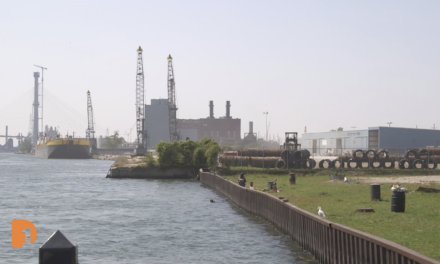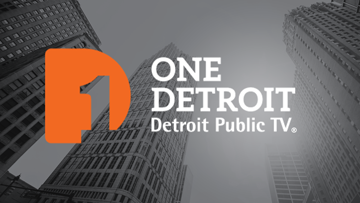Interview with Superintendent of Detroit Public Schools Nikolai Vitti
September 24, 2018
Mary Ellen Geist, Great Lakes Now
On August 30th, 2018, Superintendent of Detroit Public Schools Nikolai Vitti shut off the water to Detroit Public Schools and informed students and parents through robocalls, emails and other means of communication that students and employees would be drinking bottled water when the new school year began due to high levels of lead and copper discovered in the Detroit Public Schools’ water supply.
He acted alone, because here is no national, state or local drinking water standard for public schools in the U.S.
Many Detroit students and parents thanked Superintendent Vitti for taking action without the help of federal, state or local officials to protect public school kids’ health, and many environmentalists and others who follow the state of Great Lakes water are calling Superintendent Vitti a hero for taking costly and disruptive action to protect kids – an action that wasn’t mandated by any outside agency just a week before classes were scheduled to begin.
Greatlakesnow.org interviewed Superintendent Vitti about his controversial decision. Here are excerpts from the interview:
![]() Great Lakes Bureau: First, what’s it been like since you took this job a year ago?
Great Lakes Bureau: First, what’s it been like since you took this job a year ago?
![]() Nikolai Vitti: This job isn’t easy but I don’t approach this job as most people approach their day to day work. For me this is a passion; education for me is a passion. It’s been the vehicle for my own transformation and it’s created doors that would have never been opened for me. So, I think of this job as a calling, a blessing and a privilege in order to struggle through the day-to-day challenges we face in order to do right for children. Because I know when our children have access to strong education, their talent will shine and come through as well.
Nikolai Vitti: This job isn’t easy but I don’t approach this job as most people approach their day to day work. For me this is a passion; education for me is a passion. It’s been the vehicle for my own transformation and it’s created doors that would have never been opened for me. So, I think of this job as a calling, a blessing and a privilege in order to struggle through the day-to-day challenges we face in order to do right for children. Because I know when our children have access to strong education, their talent will shine and come through as well.
![]() Some people say this water issue is just one of many battles you’ve faced since you came on board at Detroit Public Schools.
Some people say this water issue is just one of many battles you’ve faced since you came on board at Detroit Public Schools.
![]() On the surface, I think people see this job as daunting and sometimes impossible and there are elements that are deeply unfortunate. It’s about what children deserve and what unfortunately they did not get. But I think it’s possible. We’re in a process of transformation. We have to be transparent with the challenges and issues that we face in order to create a district children deserve. In the context of those statements, this water issue is yet another example of something that was not addressed and should have been, if the right investments had been made in infrastructure, facility and even testing.
On the surface, I think people see this job as daunting and sometimes impossible and there are elements that are deeply unfortunate. It’s about what children deserve and what unfortunately they did not get. But I think it’s possible. We’re in a process of transformation. We have to be transparent with the challenges and issues that we face in order to create a district children deserve. In the context of those statements, this water issue is yet another example of something that was not addressed and should have been, if the right investments had been made in infrastructure, facility and even testing.
“I knew the system was not run the right way under emergency management”
![]() This isn’t the first job you’ve taken in an urban school district that’s facing many problems.
This isn’t the first job you’ve taken in an urban school district that’s facing many problems.
![]() I’ve had the fortune of working in some of the best large urban school districts in the country that face similar challenges because of the impact of poverty on the child’s experiences and outcomes. But I’ve seen those large urban school districts succeed because of the systems and processes that have been put in place that support employees who support children.
I’ve had the fortune of working in some of the best large urban school districts in the country that face similar challenges because of the impact of poverty on the child’s experiences and outcomes. But I’ve seen those large urban school districts succeed because of the systems and processes that have been put in place that support employees who support children.
So, when I saw the job was open in Detroit, and because I am from Metro Detroit, I applied, knowing that on paper – statistically and even anecdotally – Detroit was considered the worst large urban school district in the country. But I came back because I believe in the city, I believe in its citizens, and the city has done things for my family. And I also believe that traditional public education is a vehicle for equal opportunity, social justice and social change. And I also knew the system was not run the right way under emergency management through leaders that didn’t have an educational background, didn’t have experience with turnaround, and really didn’t know how to use a school district to create change for individual schools. So, when I arrived and I started to analyze systems and processes, it became evident that what was on paper and what was considered the worst school district in the country was in many ways confirmed.
![]() Explain. How bad was it?
Explain. How bad was it?
![]() What I found was a lack of systems and processes and a lack of a comprehensive strategic, intentional and aggressive vision of how a district should operate to support employees and children. And so this past year has been about analyzing systems and processes, and slowly but surely moving forward and offering and implementing new initiatives so we can get it right so our 50 thousand students every day can go to school empowered to use the talents that have been given to them through birth but haven’t yet been actualized. Every child is born with the opportunity for greatness. It’s the experiences they lack that don’t allow that talent to come forth, and the school system is the main determinate to allow that talent to be actualized. That has not been successful at scale in Detroit – in pockets it has, and for individual children. But it hasn’t been happening at scale. And that’s what our work and my work is about as we rebuild the district.
What I found was a lack of systems and processes and a lack of a comprehensive strategic, intentional and aggressive vision of how a district should operate to support employees and children. And so this past year has been about analyzing systems and processes, and slowly but surely moving forward and offering and implementing new initiatives so we can get it right so our 50 thousand students every day can go to school empowered to use the talents that have been given to them through birth but haven’t yet been actualized. Every child is born with the opportunity for greatness. It’s the experiences they lack that don’t allow that talent to come forth, and the school system is the main determinate to allow that talent to be actualized. That has not been successful at scale in Detroit – in pockets it has, and for individual children. But it hasn’t been happening at scale. And that’s what our work and my work is about as we rebuild the district.
![]() How did you make this controversial decision to essentially “go rogue” without involvement from the Feds or the State to test Detroit Public School water to make sure it was safe?
How did you make this controversial decision to essentially “go rogue” without involvement from the Feds or the State to test Detroit Public School water to make sure it was safe?
![]() Actually, I think it’s simple. I do this job everyday with the child and children’s faces in front. So one of our core values that we identified when we created our new strategic plan was “students first”, and I can’t emphasize it enough: every decision I make, and as we try to rebuild our culture in our district: it’s about kids, it’s about students. Our students. We are trying to create the expectations that our children are just as good or better than children throughout this country. They deserve the same thing that every middle class and upper middle class family and community demands of their school system. When the issue of the water came forward, it was based on what was best for children – and what was best for our employees . It was a hard decision, In that you are going to take on a level of criticism and concern about the state of our schools but – at the end of the day – it was the right decision. Because I could not look at myself in the mirror – I could not move forward with a clear conscience – knowing that there was a possibility children could be exposed to high levels of copper or lead. I hope EVERYONE would make that decision. Again, it goes back to expectations: we can’t have a different set of expectations for the children we serve. That’s what has happened historically in this country. That’s why we continue deal with huge economic and opportunity disparities… because we indirectly, informally, unconsciously and consciously create a set of expectations that are different for what we consider ‘other children’ – there aren’t ‘other’ children. It’s OUR children. they are ALL our children. They are all Americans, in one way or the other. And we have to start doing this more as a country. And for me, it starts in my day to day job, through the vehicle of traditional public education. I believe public education when utilized at the highest level is the great equalizer. This decision was based on that, and all of the decision I make. My decision was: we have to do right by children. We are paid every day with taxpayer dollars to get it right for children. That’s what that decision was about. That’s what all my decisions will always be about: how do we maximize the limited amount of resources we have to get it right for the children of Detroit? Because when provided the right opportunities, they will excel. They will shine. They DO shine, despite the poverty they deal with. We have to go back to creating a narrative of at-scale opportunity and “out-scale” excellence that was once part of this district and that was part of this city.. That’s what was lost and that’s what we’re trying to rebuild.
Actually, I think it’s simple. I do this job everyday with the child and children’s faces in front. So one of our core values that we identified when we created our new strategic plan was “students first”, and I can’t emphasize it enough: every decision I make, and as we try to rebuild our culture in our district: it’s about kids, it’s about students. Our students. We are trying to create the expectations that our children are just as good or better than children throughout this country. They deserve the same thing that every middle class and upper middle class family and community demands of their school system. When the issue of the water came forward, it was based on what was best for children – and what was best for our employees . It was a hard decision, In that you are going to take on a level of criticism and concern about the state of our schools but – at the end of the day – it was the right decision. Because I could not look at myself in the mirror – I could not move forward with a clear conscience – knowing that there was a possibility children could be exposed to high levels of copper or lead. I hope EVERYONE would make that decision. Again, it goes back to expectations: we can’t have a different set of expectations for the children we serve. That’s what has happened historically in this country. That’s why we continue deal with huge economic and opportunity disparities… because we indirectly, informally, unconsciously and consciously create a set of expectations that are different for what we consider ‘other children’ – there aren’t ‘other’ children. It’s OUR children. they are ALL our children. They are all Americans, in one way or the other. And we have to start doing this more as a country. And for me, it starts in my day to day job, through the vehicle of traditional public education. I believe public education when utilized at the highest level is the great equalizer. This decision was based on that, and all of the decision I make. My decision was: we have to do right by children. We are paid every day with taxpayer dollars to get it right for children. That’s what that decision was about. That’s what all my decisions will always be about: how do we maximize the limited amount of resources we have to get it right for the children of Detroit? Because when provided the right opportunities, they will excel. They will shine. They DO shine, despite the poverty they deal with. We have to go back to creating a narrative of at-scale opportunity and “out-scale” excellence that was once part of this district and that was part of this city.. That’s what was lost and that’s what we’re trying to rebuild.
“All water should be tested”
![]() Does it seem strange to you that there are no drinking water standards for public schools across the country?
Does it seem strange to you that there are no drinking water standards for public schools across the country?
![]() Whether we’re talking about Detroit or any city in this country, we should be testing all the water, not just samples of water in schools. We need to test every water source. I thjnk I’ve been very honest ad up front that this is a bigger problem in urban areas throughout the country, due to aging infrastructure and decline in enrollments.. Some of these buildings for example were built to support 500 childrenbut because of the decline in enrollment in urban areas, some building are only half utilized. Water isn’t consistently used. water isn’t consistently used. You have build-up of copper and lead due to the piping. But whether we’re talking about
Whether we’re talking about Detroit or any city in this country, we should be testing all the water, not just samples of water in schools. We need to test every water source. I thjnk I’ve been very honest ad up front that this is a bigger problem in urban areas throughout the country, due to aging infrastructure and decline in enrollments.. Some of these buildings for example were built to support 500 childrenbut because of the decline in enrollment in urban areas, some building are only half utilized. Water isn’t consistently used. water isn’t consistently used. You have build-up of copper and lead due to the piping. But whether we’re talking about
urban areas or suburban areas, all water should be tested. I will tell you: there T are high levels of cooper and lead in water outside of Detorit that are beyond the EPA limits too. It’s unfathomable that we don’t have federal, local or state regulations to test students’ water.
![]() So let’s just make this perfectly clear: you’re just on your own – in making sure the water in the Detroit Public schools is safe for kids?
So let’s just make this perfectly clear: you’re just on your own – in making sure the water in the Detroit Public schools is safe for kids?
![]() “Yes. That is correct. And that can be expanded nationally. There’s no national requirement. Those are the questions I was asking as I tried to understand the historical nature of school water testing and where we stand right now. So So after I received follow up testing from 2016 in the spring with schools that were originally identified as “concerning” or isolated water sources in those schools that we identified a concern, I said, ‘why are we not testing ALL the water in ALL of the schools and ALL of the water sources?” and the answer to that question was: ‘it’s not required.’ And I simply said , ‘Just because it’s not required, that doesn’t mean we shouldn’t do it.’ And that’s why we did it.
“Yes. That is correct. And that can be expanded nationally. There’s no national requirement. Those are the questions I was asking as I tried to understand the historical nature of school water testing and where we stand right now. So So after I received follow up testing from 2016 in the spring with schools that were originally identified as “concerning” or isolated water sources in those schools that we identified a concern, I said, ‘why are we not testing ALL the water in ALL of the schools and ALL of the water sources?” and the answer to that question was: ‘it’s not required.’ And I simply said , ‘Just because it’s not required, that doesn’t mean we shouldn’t do it.’ And that’s why we did it.
![]() What kind of money are we talking about when we talk about testing the water in a school district like Detroit’s?
What kind of money are we talking about when we talk about testing the water in a school district like Detroit’s?
![]() The financial concerns in Detroit are well documented. One of the things we did in the past year with our budget is we created a ten percent reserve – these are set-aside dollars that are not allocated for expenditures – we have a surplus over the past two years of work. And then we have a contingency, so these are dollars that are not tied to expenditures initially because as we rebuild the district we find out issues that were not previously identified. So, we utilized our surplus dollars to pay for the water testing, and we used a third party source to test the water. They independently tested and gave us the results. The results are on our website and on the letter we sent out to parents – you’ll see the numbers on the testing.
The financial concerns in Detroit are well documented. One of the things we did in the past year with our budget is we created a ten percent reserve – these are set-aside dollars that are not allocated for expenditures – we have a surplus over the past two years of work. And then we have a contingency, so these are dollars that are not tied to expenditures initially because as we rebuild the district we find out issues that were not previously identified. So, we utilized our surplus dollars to pay for the water testing, and we used a third party source to test the water. They independently tested and gave us the results. The results are on our website and on the letter we sent out to parents – you’ll see the numbers on the testing.
![]() So what did you do when you got the results back?
So what did you do when you got the results back?
![]() Once we received the test results, we immediately turned off the water at the schools where we had high levels of copper and lead. We used a company called ATS. The water testing was initiated in June and July. Up to now, we have water results for 34 schools. Not all the water sources came back with elevated levels of copper or lead. In some buildings, depending on the size, we can have 30, 40 to 60 water sources. In some buildings, there was only one; in some, more than three or three or five, So my decision to discontinue the water was the clarity across schools old and new that individual water sources with elevated levels of copper or lead be identified. So some people said, ‘well, just turn off that one water faucet’ or that one water fountain. But for me, the concern was from test to test – we did say we would test every year. You could have different water sources every year. Between those windows of tests, you could have other sources of cooper or lead, and that’ s not right for students.
Once we received the test results, we immediately turned off the water at the schools where we had high levels of copper and lead. We used a company called ATS. The water testing was initiated in June and July. Up to now, we have water results for 34 schools. Not all the water sources came back with elevated levels of copper or lead. In some buildings, depending on the size, we can have 30, 40 to 60 water sources. In some buildings, there was only one; in some, more than three or three or five, So my decision to discontinue the water was the clarity across schools old and new that individual water sources with elevated levels of copper or lead be identified. So some people said, ‘well, just turn off that one water faucet’ or that one water fountain. But for me, the concern was from test to test – we did say we would test every year. You could have different water sources every year. Between those windows of tests, you could have other sources of cooper or lead, and that’ s not right for students.
![]() Explain a little bit more about what you did when you found the high levels of lead and copper.
Explain a little bit more about what you did when you found the high levels of lead and copper.
![]() When I saw the test results – and remember we already had some schools on alternative water sources – 10 schools already using a hydrofiltration systems – I talked with the School Board chair. She agreed with me that I wanted to move in this direction of shutting off the water to all Detroit Public Schools. I called the Mayor’s office. I then informed the Michigan Department of Public Health. It was more of an FYI than for permission. So – when I got the test results for the 24 schools, 16 of those 24 had elevated levels of copper or lead. When I found out that they had higher levels we immediately turned off the water in those 16 schools. School hadn’t started yet but teachers were to arrive that Monday. Before they arrived on that Monday, that water was turned off. We then sent an automated message to parents at those 16 schools that we would discontinue water in those schools and then knowing that we had test results not in yet – we were already at a point of 34 schools out of 50 with high levels of lead and copper – I decided to shut off water to ALL schools. I informed the Mayor again, he was supportive of the decision, and I informed the Department of Public Health.
When I saw the test results – and remember we already had some schools on alternative water sources – 10 schools already using a hydrofiltration systems – I talked with the School Board chair. She agreed with me that I wanted to move in this direction of shutting off the water to all Detroit Public Schools. I called the Mayor’s office. I then informed the Michigan Department of Public Health. It was more of an FYI than for permission. So – when I got the test results for the 24 schools, 16 of those 24 had elevated levels of copper or lead. When I found out that they had higher levels we immediately turned off the water in those 16 schools. School hadn’t started yet but teachers were to arrive that Monday. Before they arrived on that Monday, that water was turned off. We then sent an automated message to parents at those 16 schools that we would discontinue water in those schools and then knowing that we had test results not in yet – we were already at a point of 34 schools out of 50 with high levels of lead and copper – I decided to shut off water to ALL schools. I informed the Mayor again, he was supportive of the decision, and I informed the Department of Public Health.
![]() What has the reaction to the shut of been from parents, kids, and teachers?
What has the reaction to the shut of been from parents, kids, and teachers?
![]() Parents have largely been supportive. Frankly, I believe we have created good will and created a better relationship with our parents and the community because of this decision. For a lot of parents and students, there was an undertone that the water might not be safe to drink. Parents and kids are coming up to me and saying, “Thank you for making this hard decision.” Some people have told me they have more trust in the district now, and some have even said they are coming back to the district from a charter school or suburban school because they are seeing more leadership in Detroit Public Schools.
Parents have largely been supportive. Frankly, I believe we have created good will and created a better relationship with our parents and the community because of this decision. For a lot of parents and students, there was an undertone that the water might not be safe to drink. Parents and kids are coming up to me and saying, “Thank you for making this hard decision.” Some people have told me they have more trust in the district now, and some have even said they are coming back to the district from a charter school or suburban school because they are seeing more leadership in Detroit Public Schools.
![]() Your decision made national headlines. Is it having an impact on other districts in other schools?
Your decision made national headlines. Is it having an impact on other districts in other schools?
![]() Obviously, I made this decision because it was the right thing to do for kids. It would have been a lot easier if there was a requirement to test the water! Other principals might not do this on their own and I’m fearful they don’t because they are afraid of conflict and challenges. It’s unfortunate, but I do think people –when they are leading – they avoid controversy and avoid crisis. But I think in many ways we AVERTED a crisis by taking ownership of the problem before someone else defined it. We’re also anecdotally hearing that more children are drinking water! That’s a positive. They’re drinking more water because the water is in a cooler from an outside water source. But I should not have to deal with this singularly as a district. We should be receiving federal support, state support. But that’s not happening. But we’re owning the problem. We’re using our surplus dollars to pay for the water. And we’re gonna continue to do that for the kids. It’s part of the process of rebuilding the district. We’re going to do this alone and with other people who can help. Because we’re going to get it right for the kids.”
Obviously, I made this decision because it was the right thing to do for kids. It would have been a lot easier if there was a requirement to test the water! Other principals might not do this on their own and I’m fearful they don’t because they are afraid of conflict and challenges. It’s unfortunate, but I do think people –when they are leading – they avoid controversy and avoid crisis. But I think in many ways we AVERTED a crisis by taking ownership of the problem before someone else defined it. We’re also anecdotally hearing that more children are drinking water! That’s a positive. They’re drinking more water because the water is in a cooler from an outside water source. But I should not have to deal with this singularly as a district. We should be receiving federal support, state support. But that’s not happening. But we’re owning the problem. We’re using our surplus dollars to pay for the water. And we’re gonna continue to do that for the kids. It’s part of the process of rebuilding the district. We’re going to do this alone and with other people who can help. Because we’re going to get it right for the kids.”
Featured Image: Superintendent Nikolai Vitti tying a student’s shoe, Photo by DPSCD









